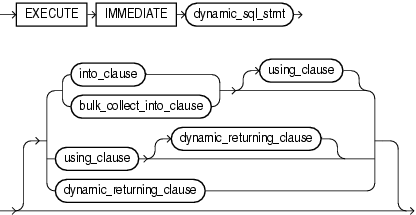| Oracle® Database PL/SQL Language Reference 11g Release 2 (11.2) Part Number E10472-05 |
|
|
View PDF |
| Oracle® Database PL/SQL Language Reference 11g Release 2 (11.2) Part Number E10472-05 |
|
|
View PDF |
The EXECUTE IMMEDIATE statement builds and runs a dynamic SQL statement in a single operation. The EXECUTE IMMEDIATE statement is the means by which native dynamic SQL processes most dynamic SQL statements.
Caution:
When using dynamic SQL, be aware of SQL injection, a security risk. For more information about SQL injection, see "SQL Injection".Topics:
Syntax
execute_immediate_statement ::=

See:
using_clause ::=

Semantics
execute_immediate_statement
dynamic_sql_stmt
A string literal, string variable, or string expression that represents a SQL statement. Its type must be either CHAR, VARCHAR2, or CLOB.
into_clause
Specifies the variables or record in which to store the column values that the statement returns. For more information about this clause, see "RETURNING INTO Clause".
Restriction on into_clause Use if and only if dynamic_sql_stmt returns a single row.
bulk_collect_into_clause
Specifies one or more collections in which to store the rows that the statement returns. For more information about this clause, see "RETURNING INTO Clause".
Restriction on bulk_collect_into_clause Use if and only if dynamic_sql_stmt can return multiple rows.
using_clause
Specifies bind arguments.
Restrictions on using_clause
Use if and only if dynamic_sql_stmt includes placeholders for bind arguments.
If dynamic_sql_stmt has a RETURNING INTO clause, using_clause can contain only IN bind arguments. The bind arguments in the RETURNING INTO clause are OUT bind arguments by definition.
dynamic_returning_clause
Returns the column values of the rows affected by the dynamic SQL statement, in either individual variables or records. For more information about this clause, see "RETURNING INTO Clause".
Restriction on dynamic_returning_clause Use if and only if dynamic_sql_stmt has a RETURNING INTO clause.
using_clause
IN, OUT, IN OUT
Parameter modes of bind arguments. An IN bind argument passes its value to dynamic_sql_stmt. An OUT bind argument stores a value that dynamic_sql_stmt returns. An IN OUT bind argument passes its initial value to dynamic_sql_stmt and stores a value that dynamic_sql_stmt returns. The default parameter mode for bind_argument is IN.
bind_argument
An expression whose value replaces its corresponding placeholder in dynamic_sql_stmt at run time.
Every placeholder in dynamic_sql_stmt must be associated with a bind_argument in the USING clause or RETURNING INTO clause (or both) or with a define variable in the INTO clause.
You can run dynamic_sql_stmt repeatedly using different values for the bind arguments. You incur some overhead, because EXECUTE IMMEDIATE prepares the dynamic string before every execution.
Restriction on bind_argument The value of bind_argument cannot be TRUE, FALSE, or NULL. To pass the value NULL to the dynamic SQL statement, use an uninitialized variable where you want to use NULL, as in "Uninitialized Variable for NULL in USING Clause".
Examples
Example 7-1, "Invoking a Subprogram from a Dynamic PL/SQL Block"
Example 7-3, "Uninitialized Variable for NULL in USING Clause"
Example 7-5, "Repeated Placeholder Names in Dynamic PL/SQL Block"
Related Topics
In this chapter:
In other chapters: